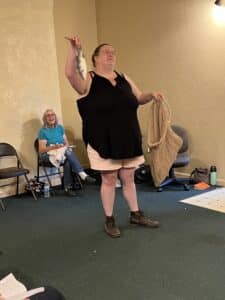Why Men on Boats?

With Men on Boats, we hope to offer a thrilling theatrical adventure that takes you on an unforgettable journey through uncharted territories. As a creative team, we have embraced the opportunity to explore imaginative staging, innovative design, and it has challenged us to push the boundaries of traditional theater and create an immersive experience that captivates the senses and sparks the imagination.
Jaclyn Backhaus’ brilliant writing reexamines the 1869 Grand Canyon expedition, originally led by male explorers, through the lens of an all-female cast. At the heart of the story lies a tale of self-discovery, resilience, of camaraderie and determination. The characters embark on a journey not only through the Grand Canyon but also towards a deeper understanding of themselves, testing themselves against a great unknown.
In our current era, we find ourselves in a time of questioning, where we challenge long-held ideas and even scrutinize the legacies of our once-revered heroes. This is necessary and vital. As we honestly explore history, we confront the harsh realities that accompany acts of patriotism and exploration. It becomes evident that amidst these pursuits, injustices, and subjugation have often been perpetuated.
Yet, as we delve into the lives of historical figures we must also acknowledge the complexities of human nature. They were not flawless saints, and not every action or attribute should be praised. But there existed within them a certain heroism and poetry, and sometimes grace. Beyond their bombast and grandiosity, there lay a profound humility, and sometimes nobility.
This play urges us to embrace the notion that, in the words of Hamlet, speaking of his begreived and beloved father, “He was a man; take him for all in all.” Viewing them in their entirety, with their imperfections and virtues interwoven, we see multifaceted individuals. The past is a tapestry of diverse human experiences, and by examining it honestly, we gain a deeper understanding of our shared humanity.
As we journey through Men On Boats, let us be open to perceiving these historical figures as neither icons nor villains, but as complex beings shaped by their time and circumstances. By doing so, we can confront the past with both critical eyes and compassionate hearts, recognizing that in the story of every explorer and adventurer, nay, of every one of us, there are shades of light and shadow. Let us, too, be explorers, but of that most awe-inspiring realm: the human spirit. Let us be discoverers, through thought-provoking conversations, of what it truly means to be “a man” or “a woman” – or “human” – as we live the grand tapestry of history.
